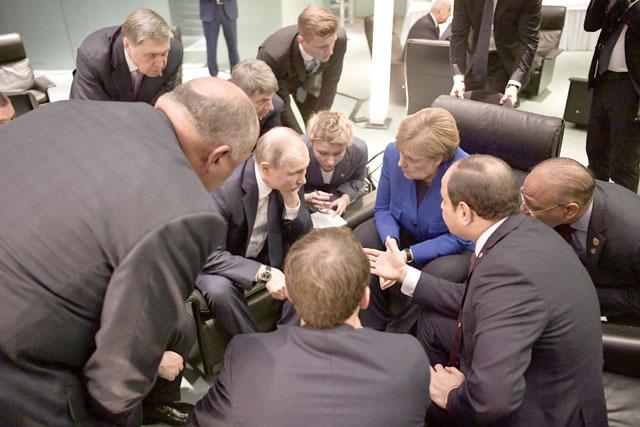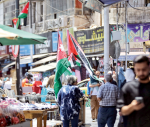You are here
UN slams ongoing Libya arms embargo violations
By AFP - Jan 27,2020 - Last updated at Jan 27,2020
TRIPOLI — Weapons are pouring into Libya in violation of an arms embargo and despite commitments made by world powers, the UN's mission in Libya has said as Germany expressed concern about reports of infringements.
World leaders met in Berlin last weekend and committed to ending all foreign meddling in Libya and to upholding the 2011 UN Security Council weapons embargo as part of a broader plan to end the country's conflict.
They also agreed to a permanent ceasefire and steps to dismantle numerous militias and armed groups, as well as a political process under the auspices of the UN.
The UN mission in Libya, UNSMIL, said in a statement late Saturday it "deeply regrets the continued blatant violations of the arms embargo in Libya".
"Over the last 10 days, numerous cargo and other flights have been observed landing at Libyan airports in the western and eastern parts of the country, providing the parties with advanced weapons, armoured vehicles, advisers and fighters," it added.
On Sunday, Germany’s foreign ministry expressed support for the UNSMIL statement, along with concern about “a series of unconfirmed but credible reports of embargo violations on both sides”.
Libya has been mired in chaos since a 2011 NATO-backed uprising that killed longtime dictator Muammar Qadhafi, with two rival administrations vying for power.
The conflict deepened last year when military strongman Khalifa Hafter, who controls much of the south and east of Libya, launched an assault in April to seize Tripoli, base of the UN-recognised Government of National Accord.
Haftar has the backing of Egypt, the United Arab Emirates and Russia while the GNA is supported by Qatar and Turkey.
On Sunday Turkish President Recep Tayyip Erdogan arrived in the Algerian capital to discuss the crisis in Libya, where a ceasefire went into effect on January 12 at the initiative of Moscow and Ankara.
UNSMIL said the ceasefire, which had provided much-needed respite for civilians in Tripoli, was now at risk of collapse.
“This fragile truce is now threatened by the ongoing transfer of foreign fighters, weapons, ammunition and advanced systems to the parties by member states, including several who participated in the Berlin conference,” it said.
Civilian casualties
Haftar launched the assault to seize Tripoli in April last year.
The UN says the fighting has killed more than 280 civilians and over 2,000 combatants, while thousands have been wounded on both sides. More than 170,000 Tripoli residents have been displaced.
Renewed clashes around Tripoli on Saturday killed at least one civilian — a Moroccan national — and wounded seven others, GNA health ministry spokesperson Amin Al Hashemi told AFP.
“The mission condemns these ongoing violations, which risk plunging the country into a renewed and intensified round of fighting,” UNSMIL said.
The UN is hoping to hold inter-Libyan talks soon in Geneva to consolidate the truce.
A military commission established at the Berlin summit — comprising five GNA loyalists and five Haftar delegates — has been tasked to define ways of making the truce hold.
“What’s important now is to achieve a stable ceasefire, which the military committee ‘5 + 5’... wants to negotiate in the coming days,” the German foreign ministry said.
Erdogan’s visit to Algiers came after Libya’s neighbours met for talks in the Algerian capital on Thursday.
Ankara dispatched troops — in a training capacity, it said — to support the GNA earlier this month in a move criticised by European powers and US President Donald Trump.
Erdogan has warned Europe it could face new threats from terrorist organisations if the GNA in Tripoli were to fall.
Western powers are keen to stabilise Libya — home to Africa’s largest proven crude reserves — because of concerns extremists and migrant smugglers, already active, will take advantage of the chaos.
The National Oil Corporation said on Saturday that Libya’s oil production had plunged by around three-quarters since pro-Haftar forces launched a blockade the day before the Berlin summit, causing estimated losses of $256 million.
Related Articles
TRIPOLI — The United Nations' Libya mission said on Tuesday the country's warring parties had agreed to restart talks aimed at reaching a la
BERLIN — World leaders committed on Sunday to ending all foreign meddling in Libya's war and to uphold a weapons embargo at a Berlin summit,
TRIPOLI — The United Nations condemned Wednesday the obstruction of its flights into conflict-hit Libya by forces loyal to strongman Khalifa
















